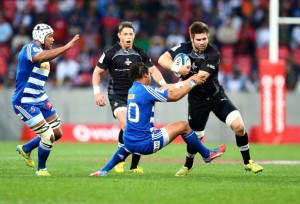
Getting involved: Sean Maitland of Glasgow Warriors tries desperately to save a try in last season’s Heineken Cup
By Alan Dymock
CRIERS ALL over the land are shouting: ‘the Heineken Cup is dead. Long live the potential for an accord between the Anglo-French alliance and a possibly toothless and certainly smarting governing body.’
As clear as mud and just as pretty, the dialogue between unyielding factions on the future of European rugby seems unlikely to produce a dialectic any time soon. Not that it can ever end badly for the English or French. Whatever happens they will have forced through massive change.
Is that necessarily a bad thing? It depends on your stance. However, there are views to be taken and ones that can bridge the concerns of more than one nation.
Take Conor O’Shea, for example. An Irishman in charge of one of the bigger teams in England, he took part in a debate on the future of European rugby on Irish channel RTE at the weekend. He spoke with Shane Horgan and Donal Lenihan of his desire for the best teams throughout Europe, not just England and France, to take part and said he believed that it would happen because if there is a will there will be a way.
However it was after this point that Scotland and Italy came up. Forever branded the rag-dressed paupers of the debate, it was batted back and forth that either Union would crumble into powdery messes after a few seasons out of top European competition or that they could, maybe, perhaps develop in an Amlin-alike competition.
Ignoring the fact that all involved in this debate assumed that neither Scottish side would make a top six finish – despite Glasgow Warriors being one of the best teams in the division for a few years now – or that a tricky Treviso side would ever be capable of raising it’s game, it all came back to their shortcomings.
“I buy the [issue concerning] governance of the game, hugely,” O’shea said. “ That is a massive, massive part of what this is about and that has to be sacrosanct, but the development of the game and saying that they’ll fall apart if you don’t have an Italian side in it for a season or two seasons is, from my point of view, wrong.”
Then he was given the poser by Horgan that there should be a sense of responsibility if the Scots sides were hammered, failed to qualify, lost crowds, lost players and couldn’t sign stars from abroad. O’Shea replied: “You know what you’ll do? You’ll get a Scottish Rugby Union invest in bringing through their own players, play their own players, develop their own players, retain their own players and actually see them come through as a force rather than bringing in loads of players which they are doing at the moment.
“They did it when they started and said ‘we’re going to have two districts, let the Borders go’. Don’t look and sympathise all the time and say that they didn’t have the opportunity. It would be like me going down and saying: ‘Munster? We won’t have Munster.’ They went to the Borders and said: ‘no Borders.’ How can you do that?”
Some may see this as irrelevant, particularly as most pundits would concede that Glasgow Warriors have improved yearly and look set to finish in a top six again this term with a majority of Scots, but the issue of foreign input does come up elsewhere.
There are only two places for Scots teenagers to aspire to at the moment, if you do not count London Scottish. The bed has been made and the sheets may be crinkly and scratchy, but there must be a goal for young Scots to develop into a major competition. Edinburgh signing a South African back-row this week, Cornell Du Preez, may make them an uglier outfit, but it isn’t a move in the best interest of Scotland.
Maybe Donal Lenihan is right. He said in the debate that they should seek to “ring-fence” one Scots and Italian team for Heineken 2.0. If that happened then they could cave in on some financial demands and distribution rights. A few years in the second-tier European competition is not an exile. Plus every proposal so far has suggested that the winners of the Amlin-alike qualify for the Heineken-alike a year later. Hardly the stuff of nightmares.








